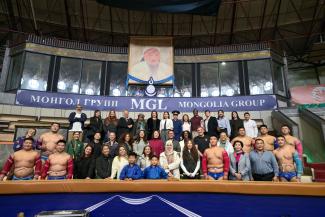Yariguin Final Pairings Set for Saturday Night
Friday, January 25, 2019 - 20:50 By Eric Olanowski

KRASNOYARSK, Russia (January 25) - The Russian Federation inserted at least one wrestler into the finals in six of the seven weight classes that'll be up for the taking on Saturday night.
In freestyle, Russia continued to plow through the competition and prove why they’re the most dominant freestyle nation in the world. They followed Friday's three gold medal performances by claiming five of Saturday’s six finals spots.
Turkish big-man Taha AKGUL, a two-time world and Rio Olympic champion, is the only non-Russian freestyle wrestler that'll compete for a gold medal on Saturday night. He'll wrestle Anzor KHIZRIEV (RUS) in the 125kg gold-medal match.
In women’s wrestling, Russia won a pair of gold medals on Friday night and has an opportunity to claim three additional golds on Saturday night when five wrestlers compete in the finals.
The lone weight class where a non-Russian woman can claim a Yariguin gold medal is at 68kg. This weight class will feature the all-Mongolian battle between 2015 world champion SORONZONBOLD Battsetseg and ENKH AMAR Davaanasan.
The finals are set to begin on Saturday at 18:00 (local time).
Finals Matchups
Freestyle
65kg - Akhmed CHAKAEV (RUS) vs. Nachyn KUULAR (RUS)
79kg - Akhmed GADZHIMAGOMEDOV (RUS) vs. Magomed RAMAZANOV (RUS)
125kg - Taha AKGUL (TUR) vs. Anzor KHIZRIEV (RUS)
Women’s Wrestling
53kg - Natalia MALYSHEVA (RUS) vs. Sarah Ann HILDEBRANDT (USA)
57kg - Olga KHOROSHAVTSEVA (RUS) vs. Tserenchimed SUKHEE (MGL)
62kg - Anzhela FOMENKO (RUS) vs. Anna SHCHERBAKOVA (RUS)
68kg - Battsetseg SORONZONBOLD (MGL) vs. ENKH AMAR Davaanasan (MGL)


Share your thoughts.
Comments